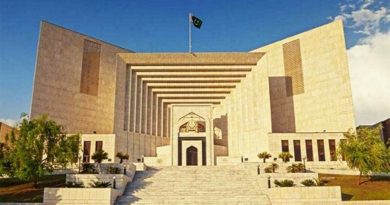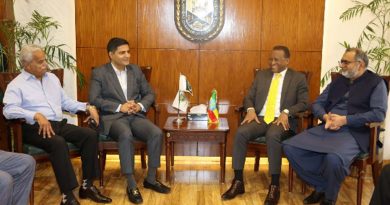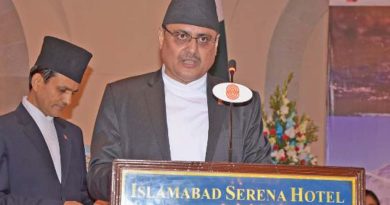Nato summit commits to higher spending and collective defence
Field Marshal Asim Munir an impressive, great man: Trump
THE HAGUE: Nato leaders on Wednesday backed a big increase in defence spending and restated their commitment to defend each other from attack after a brief summit tailor-made for United States President Donald Trump.
In a short statement, Nato endorsed a higher defence spending goal of 5 per cent of GDP by 2035, a response to a demand by Trump and to Europeans’ fears that Russia poses a growing threat to their security following the 2022 invasion of Ukraine.
“We reaffirm our ironclad commitment to collective defence as enshrined in Article Five of the Washington Treaty that an attack on one is an attack on all,” the statement said, after Trump had sparked concern on Tuesday by saying there were “numerous definitions” of the clause.
But just before the summit opened, Trump had said of fellow Nato members: “We’re with them all the way.”
Trump lauded the “tremendous” summit in The Hague as leaders wrapped up a meeting that saw the alliance back his demand to ramp up defence spending.
“I think the summit was fantastic. It was a big success,” Trump told Dutch Prime Minister Dick Schoof.
Spending to jump by hundreds of billions
The 32-nation alliance, for its part, heeded a call by Trump for other countries to step up their spending on defence to reduce Nato’s reliance on the US.
Nato Secretary General Mark Rutte acknowledged that it was not easy for European countries and Canada to find the extra money, but said it was vital to do so.
“There is absolute conviction with my colleagues at the table that, given this threat from the Russians, given the international security situation, there is no alternative,” the former Dutch prime minister told reporters in his home city of The Hague.
The new spending target, to be achieved over the next 10 years, is a jump worth hundreds of billions of dollars a year from the current goal of 2pc of GDP, although it will be measured differently.
Countries would spend 3.5pc of GDP on core defence — troops and weapons — and 1.5pc on broader defence-related measures such as cyber security, protecting pipelines and adapting roads and bridges to handle heavy military vehicles.
The fragile ceasefire between Israel and Iran appeared to be holding on Wednesday while US President Donald Trump asserted that US and Iranian officials will talk next week, giving rise to cautious hope for longer-term peace even as Tehran insisted it will not give up its nuclear program.
Trump told reporters at a NATO summit that he wasn’t particularly interested in restarting negotiations with Iran, insisting that US strikes had destroyed its nuclear program. Earlier in the day, an Iranian official questioned whether the United States could be trusted after its weekend attack.
“We may sign an agreement, I don’t know,” Trump said. “The way I look at it, they fought, the war is done.”
Earlier, Trump said the ceasefire was going “very well,” and added that Iran was “not going to have a bomb and they’re not going to enrich.”
President Trump said that the US has not given up its maximum pressure on Iran, including restrictions on sales of Iranian oil, but signalled a potential easing in enforcement to help the country rebuild.
“They’re going to need money to put that country back into shape. We want to see that happen,” Trump said at a news conference at the Nato Summit when asked if he was easing oil sanctions on Iran.
President Trump likened Washington’s strike on Iran’s nuclear facilities to the US dropping of atomic bombs on the Japanese cities of Hiroshima and Nagasaki to end World War II, AFP reports.
“Actually, if you look at Hiroshima, if you look at Nagasaki, you know that ended a war too,” Trump said as he wrapped up Nato’s summit in The Hague.
“This ended a war in a different way, but it was so devastating.”
“Was it bad? It was really bad,” Trump said. “It was obliterated.”
Trump, speaking in The Hague where he attended a NATO summit on Wednesday, said that if Iran tried to rebuild its nuclear program, “We won’t let that happen and he was confident Tehran would not try to rebuild its nuclear sites and would instead pursue a diplomatic path toward reconciliation.
Trump said his decision to join Israel’s attacks by targeting Iranian nuclear sites with huge bunker-busting bombs had ended the war, calling it “a victory for everybody.”Number one, militarily we won’t,” he said, adding that he thought “we’ll end up having something of a relationship with Iran” to resolve the issue.
Donald Trump reveled in the swift end to war between Iran and Israel, saying he now expected a relationship with Tehran that would preclude rebuilding its nuclear program despite uncertainty over damage inflicted by US strikes.
As exhausted and anxious Iranians and Israelis both sought to resume normal life after the most intense confrontation ever between the two foes, Iran’s president suggested that the war could lead to reforms at home.
He shrugged off an initial assessment by the US Defense Intelligence Agency that Iran’s path to building a nuclear weapon may have been set back only by months, saying the findings were “inconclusive” and he believed the sites had been destroyed.
“It was very severe. It was obliteration,” he said.
“I’ll tell you, the last thing they want to do is enrich anything right now. They want to recover,” he said.
President Masoud Pezeshkian, a relative moderate elected last year in a challenge to years of dominance by hard-liners, said the atmosphere of national solidarity during the Israeli attacks would spur domestic reform.
“This war and the empathy that it fostered between the people and officials is an opportunity to change the outlook of management and the behavior of officials so that they can create unity,” he said in a statement carried by state media.
Still, Iran’s authorities moved swiftly to demonstrate their control. The judiciary announced the execution of three men on Wednesday convicted of collaborating with Israel’s Mossad spy agency and smuggling equipment used in an assassination. Iran had arrested 700 people accused of ties with Israel during the conflict, the state-affiliated Nournews reported.
Field Marshal Asim Munir an impressive, great man: Trump
The Hague: US President Donald Trump on Wednesday once again heaped praise on Field Marshal Asim Munir, who he recently met at White House, and reiterated his stance that he stopped last month’s conflict between the nuclear-armed Pakistan and India.
Addressing a press conference after attending the annual NATO summit in The Hauge, the US president called the Pakistan-India conflict the “most important” of all the recent ones, saying both countries have nuclear weapons and he ended that with a series of phone calls on trade.
“I said look if you are going to go fighting each other… it was getting very bad… I said if you are going to go fighting each other then we are not going to do trade deals,” Trump said.
Praising Field Marshal Munir, Trump said: “I met General from Pakistan last week in my office — a very impressive personality, a great man.”
He also described Indian Prime Minister Narendra Modi as a close friend, stating: “Modi is a great friend of mine. A great gentleman.”
“We got them to reason and I said we are not doing any trade deal if you are going to fight… and you know what they said no I want to do the trade deal and we stopped a nuclear war,” he added.–Agencies



